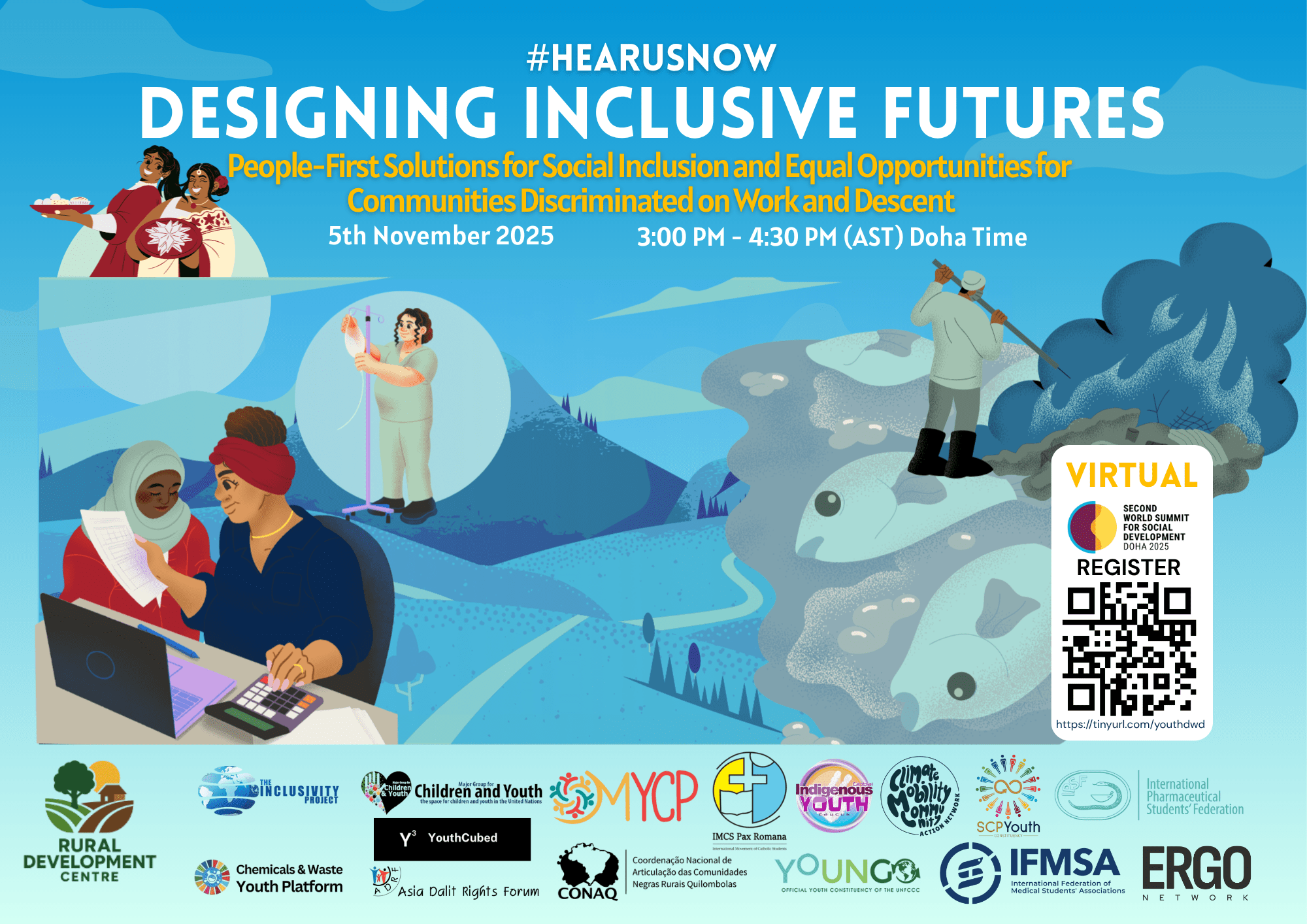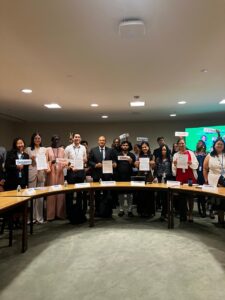
- This event has passed.
Designing Inclusive Futures: People-First Solutions for Social Inclusion and Equal Opportunities for Communities Discriminated on Work and Descent
November 5, 2025 @ 3:00 pm - 4:30 pm +03

#HEARUSNOW
Background:As the WSSD-2 convenes, this Solutions Session will spotlight community-led and multi-stakeholder initiatives addressing those most affected by social crises. Youth groups, stakeholders, IGOs, and Member States will present case studies/solutions focused on the contexts of Communities Discriminated on Work and Descent (CDWD) with intersections to Indigenous Peoples, and Migrants/Refugees under the theme of social inclusion and decent work for all.
A regional analysis, compiled by UNECE as an input to WSSD-2, elaborates how poverty and exclusion disproportionately affect frontline groups. While extreme monetary poverty is rare in some regions, multidimensional poverty rates exceed 20%, hitting women, children, Roma communities, and migrants hardest. This highlights the deep structural inequalities that must frame WSSD-2 discussions. The 2024 report on the status of Communities Discriminated on Work and Descent (CDWD) – which includes Dalits in South Asia, Haratin and Osu in Africa, Roma in Europe, and Quilombolas in Latin America – shows that over 270 million people face entrenched discrimination. Despite 80 years of UN efforts, concepts of untouchability persist, denying these communities access to decent work, education, justice, and secure livelihoods, with discrimination ingrained in social systems. This is worsened by environmental crises and economic precarity, hitting Indigenous peoples, migrants, refugees, and other marginalized groups hardest, especially children and young women. Yet CDWD and excluded youth are leading change and advancing justice, and building societies rooted in dignity and equity.

Against this backdrop, this session will:
- Showcase case studies from CDWD organisations and allied partners, with a cross-cutting focus on youth, Indigenous peoples, and refugees
- Highlight key solutions – in the form of policy suggestions and concrete actions proposed by the CDWD youth groups, UN agencies, and other stakeholders – and the role of multi-stakeholder partnerships in delivering these
The session will culminate in a compendium of solutions/policy recommendations as a resource for Summit follow-up and implementation.
Systemic exclusion affects many communities — including CDWD, Indigenous peoples, migrants, refugees, people with disabilities, racial and ethnic minorities, and those experiencing homelessness — driven by structural discrimination, displacement, climate crises, and economic precarity. These impacts fall hardest on children and youth, especially young women. For many, migration becomes the only option amid collapsing ecosystems, insecure land rights, and shrinking labor markets, yet pathways remain unsafe and exploitative. In the face of these challenges, CDWD and other excluded youth are leading change: challenging discrimination, demanding migration justice, advancing climate resilience, and shaping rights-based solutions for livelihoods, land, and water. Their leadership and solidarity are essential to building societies rooted in dignity, justice, and equity.
Objectives:
- Identify and dismantle systemic barriers faced by communities discriminated on work and descent, Indigenous peoples, migrants, refugees, and other excluded groups by surfacing community-driven and youth-led solutions that advance decent work, social inclusion, and human rights.
- Propose and showcase scalable community- and youth-led innovations – from local to global levels – that address discrimination, migration justice, gender inequality and economic exclusion, with clear pathways for policy adoption and institutionalisation.
- Generate actionable, gender-responsive policy solutions rooted in grassroots experiences, to inform WSSD2 outcomes and align with SDGs on poverty eradication, decent work and social inclusion.
- Foster international solidarity and resource solutions that work by securing commitments to support community, women and youth-led solutions through funding, capacity strengthening and rights-based partnerships at all levels.
FORMAT:
Opening Remarks (5 mins)
Solutions Showcase – Youth and Community Leaders (20 mins)
Policy and Partnerships Dialogue (15 mins)
Interactive Co-creation Segment (15 mins)
Closing & Way Forward (5 mins)

